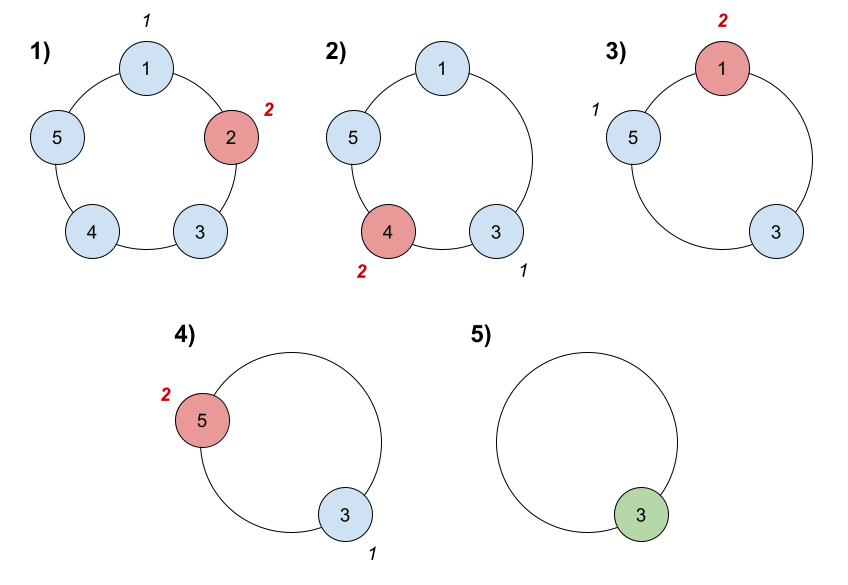Problem 1823 Find the Winner of the Circular Game
Table of Contents
Problem Statement
Link - Problem 1823
Question
There are n friends that are playing a game. The friends are sitting in a circle and are numbered from 1 to n in clockwise order. More formally, moving clockwise from the ith friend brings you to the (i+1)th friend for 1 <= i < n, and moving clockwise from the nth friend brings you to the 1st friend.
The rules of the game are as follows:
- Start at the
1stfriend. - Count the next
kfriends in the clockwise direction including the friend you started at. The counting wraps around the circle and may count some friends more than once. - The last friend you counted leaves the circle and loses the game.
- If there is still more than one friend in the circle, go back to step 2 starting from the friend immediately clockwise of the friend who just lost and repeat.
- Else, the last friend in the circle wins the game.
- Given the number of friends, n, and an integer k, return the winner of the game.
Note
This is exactly the same as the Josephus problem, but with a different name. It is also called the n-people game.
Example 1

Input: n = 5, k = 2
Output: 3
Explanation: Here are the steps of the game:
1. Start at friend 1.
2. Count 2 friends clockwise, which are friends 1 and 2.
3. Friend 2 leaves the circle. Next start is friend 3.
4. Count 2 friends clockwise, which are friends 3 and 4.
5. Friend 4 leaves the circle. Next start is friend 5.
6. Count 2 friends clockwise, which are friends 5 and 1.
7. Friend 1 leaves the circle. Next start is friend 3.
8. Count 2 friends clockwise, which are friends 3 and 5.
9. Friend 5 leaves the circle. Only friend 3 is left, so they are the winner.
Example 2
Input: n = 6, k = 5
Output: 1
Explanation: The friends leave in this order: 5, 4, 6, 2, 3. The winner is friend 1.
Constraints
- `1 <= k <= n <= 500`
Solution
class Solution {
public:
int findTheWinner(int N, int k) {
int i = 1, ans = 0;
while (i <= N) {
ans = (ans + k) % i;
i++;
}
return ans + 1;
}
};
Complexity Analysis
Time Complexity: O(N)Space Complexity: (1)
Explanation
1. Intuition
- We know that we can find the winner by simulating the result of each round from 1 to N.
- We will count `k` friends in the clockwise direction including the friend we started at.
- The quantity `ans` will store the index of the winner of each round.
- We will return the winner of the last round.
- The value `(ans+k)%i` will give us the index of the winner of the next round.
- How does it give the index of winner ?
- Let's say we have `i` friends and we are at the `jth` friend.
- We need to find the index of the winner of the next round.
- We know that the winner of the next round will be the winner of the current round plus `k` friends.
- but since the friends are being removed from the circle, we need to take the modulo of the number of friends got removed.
- This will give us how many indexes we need to move from the current index to get the winner of the next round.
TLDR
- When there are n people, the person leaving is (k-1) positions away from the current starting person.
- The new starting position is the next person clockwise after the person who leaves.
- The winner for n people can be found using the winner of n-1 people adjusted by the counting step k.
- Don't forget to re-index to 1-indexing. Add 1 to the final answer.
2. Implementation
- Initialize the variables `i` and `ans` to 1 and 0 respectively.
- Iterate from 1 to N.
- Update the value of `ans` to `(ans+k)%i`.
- Return the value of `ans+1`.
Alternate Approach
class Solution {
public:
int findTheWinner(int n, int k) {
// Initialize vector of N friends, labeled from 1-N
vector<int> circle;
for (int i = 1; i <= n; i++) {
circle.push_back(i);
}
// Maintain the index of the friend to start the count on
int startIndex = 0;
// Perform eliminations while there is more than 1 friend left
while (circle.size() > 1) {
// Calculate the index of the friend to be removed
int removalIndex = (startIndex + k - 1) % circle.size();
// Erase the friend at removalIndex
circle.erase(circle.begin() + removalIndex);
// Update startIndex for the next round
startIndex = removalIndex;
}
return circle.front();
}
};
- Time Complexity: O(N^2)
- Space Complexity: O(N)
Explanation
- Just simulate the game by removing the friends one by one.
- Keep track of the index of the friend to start the count on.
- Calculate the index of the friend to be removed.
- Erase the friend at the removal index.
- Update the startIndex for the next round.
- Return the winner of the game.